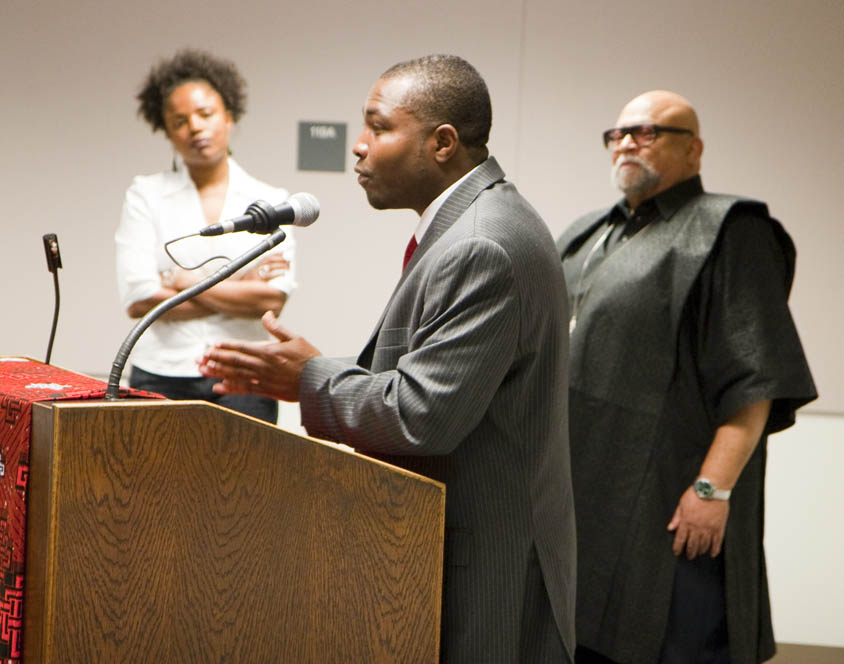More than 100 students gathered yesterday for a forum on Haiti in the Anatol Center. The forum, “Standing in Solidarity with Haiti: Conversations on History, Caring and Support,” discussed the culture, history and current state of affairs of Haiti.
“This forum on Haiti is very timely. Haitians are strong and resistant — they have overcome much,” said Maulana Karenga, an Africana studies professor. “Today, Haiti faces a new challenge: to overcome this terrible tragedy and set up a new future for themselves.”
The world has opened its heart to Haiti, and the country will need continuous support until it can support itself, Karenga said.
Also speaking on the Haiti panel was Haiti-born Idor Laurent, co-founder of LA Coalition in Solidarity with Haiti, and Haitian American Myriam Joseph, assistant to the dean of the College of Liberal Arts.
“It has been over a month since Haiti was devastated. People have become homeless. Children have become homeless,” said Laurent, a Cal State Long Beach alumnus. “It is my belief that the people of Haiti will overcome their miseries.”
Laurent went on to give a brief history of Haiti, mentioning that during the 1700s, Haiti was more profitable than the 13 colonies and, despite this, Haiti has had a long history of oppression and debt imposed by foreign countries.
“Haiti will never recover unless the world cancels its debts,” Laurent said. “What happened in Haiti is important — it created an opportunity for Haiti to decentralize and change the status of its elite.”
Joseph, who was born in Brooklyn and attended school in Haiti, reflected on how Haiti influenced her life and perceptions.
“In Haiti, education is the main priority,” Joseph said. “Now, people really get to see what Haitians are capable of. There’s a really strong, joyful people who live there. Haitians have already created a system of taking care of each other.”
In a few months, missionaries will be on TV showing pictures of starving children with swollen bellies and flies circling them — this is not the real Haiti. People need to change the story of how Haiti is perceived, Joseph said.
Karenga addressed the crowded room again, saying that the problems facing the Haitian people were rooted in external conflict, not internal or spiritual, as the Rev. Pat Robertson suggested.
Robertson said in a Jan. 13 interview on the Christian Broadcast Network’s 700 Club that “[Haitians] were under the heel of the French, uh, you know, Napoleon III and whatever, and they got together and swore a pact to the devil. They said, ‘We will serve you if you’ll get us free from the French. True story.
“And so the Devil said, ‘Okay, it’s a deal.’ And, uh, they kicked the French out. You know, the Haitians revolted and got themselves free. But ever since, they have been cursed by — by one thing after another, desperately poor.”
Karenga stressed the importance of genuine respect for Haiti and the Haitian people in order for them to rebuild.
“We must respect them not only as humans, but as humans with a unique culture,” Karenga said. “We must recognize the importance of people rebuilding themselves. The masses are equal to the problems that confront them.”
Students attending the forum found a new perspective on the devastated country.
“[The forum] made me know more about the Haiti situation,” said Adrian Pascual, a sophomore nursing major.
“I learned more about the Haiti disaster and how we don’t see anything because of the media,” said David Ceja, a freshman music and communications major. “A lot of cultures have a ‘Haiti.’ We centralize on Haiti and don’t look at the whole thing.”
Karenga closed the forum asking for the return of the former Haitian president Jean-Bertrand Artistide, who was overthrown in 2004.
“How do you deny the people a legitimate speaker for them?” Karenga asked. “People have the right to rule themselves.”




